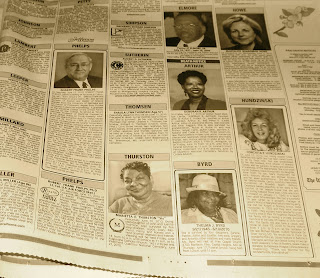 Many times in the past, I'm sure, I rolled my eyes if I saw an old person poring over the Obituaries section in the newspaper. I thought it was morbid, their trying to find a familiar face or life, perhaps also trying to see who among their elderly friends had made it through another week.
Many times in the past, I'm sure, I rolled my eyes if I saw an old person poring over the Obituaries section in the newspaper. I thought it was morbid, their trying to find a familiar face or life, perhaps also trying to see who among their elderly friends had made it through another week. But more and more these days, my eyes are drawn to that section of the Washington Post. Maybe it's because I am getting older and I've begun to occasionally see the names of acquaintances and neighbors there. That's not the only reason, though. I've started to see beauty in the brief prose that sums up a life.
Read past the horrifyingly succinct labels in the sub-heads (e.g., "Teacher," "Jewelry Maker," "Guidance Counselor," "Church Member") and you can see a road map of a life in retrospect:
- The "Church Member" assisted amputees for the Red Cross during WWII. (How?)
- The "Jewelry Maker"'s first marriage ended in divorce. (Why?)
- The "Guidance Counselor" danced professionally when she was young; her husband died 13 years before she did. (Did she miss him? Did she miss dancing?)
Most obits in the Post are written in the same four or five-paragraph format: (First p.) the person's full name, age, cause of death, and current town; (Middle paragraphs) significant events and achievements—jobs, degrees, volunteer positions; (Final p.) survivors. Were they happy? Bitter? Anxious? Regretful? Loved? The obits never say. The story, the poetry even, is in the words not written, the broad and full life that cannot be described so formulaically.
More distinct are the "In Memoriam" boxes that people put in the paper, usually on the anniversary of their loved one's death or birthday. The most heart-wrenching "In Memoriam" ads are those to children. On the first anniversary of an 11-year-old's death, her family ran a photo of her with the dates of her life beneath, and then the text of something she must have written shortly before she died: "If I were President...I would stop war. I would also want to try to stop pollution. If I can stop it, I will."... Is there anything more tragic than what is contained in these four column inches?
I still remember an "In Memoriam" I read a couple of years ago; beneath the photo of an ordinary-looking middle-aged man who had died five years before were these words: "I would give one year of my life to spend another day with you." That's a story there that could be written a hundred different ways by a hundred different people. Even the person who placed that ad could describe her life/their life a hundred different ways—and the story would never be completely and fully told.



2 comments:
I remember Alice listening to the obits on the radio every day. At the end it would say that this service had been brought to you by Reins-Sturdivant. They always played a cheesy hymn in the background. I kidded her about it unmercifully and she always laughed, but she never missed a day!
I love this, Beth--obituaries are wonderful. I tell people I read them to make sure I'm not in there.
The recent one on Robert Byrd was especially wonderful, I thought.
Barbara Young
P.S. You're still missed in Greenbelt
Post a Comment